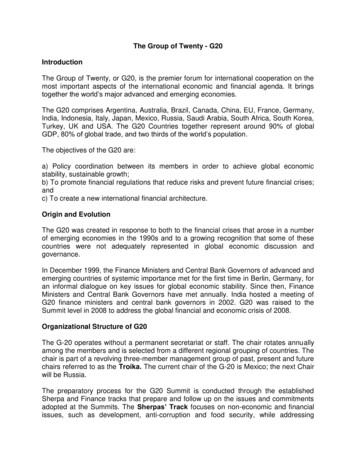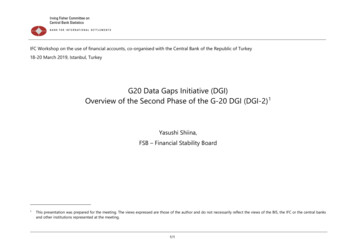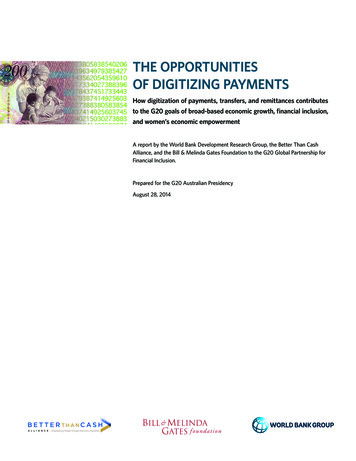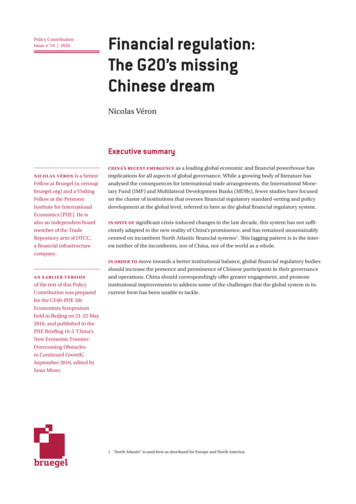
Transcription
The Group of Twenty - G20IntroductionThe Group of Twenty, or G20, is the premier forum for international cooperation on themost important aspects of the international economic and financial agenda. It bringstogether the world’s major advanced and emerging economies.The G20 comprises Argentina, Australia, Brazil, Canada, China, EU, France, Germany,India, Indonesia, Italy, Japan, Mexico, Russia, Saudi Arabia, South Africa, South Korea,Turkey, UK and USA. The G20 Countries together represent around 90% of globalGDP, 80% of global trade, and two thirds of the world’s population.The objectives of the G20 are:a) Policy coordination between its members in order to achieve global economicstability, sustainable growth;b) To promote financial regulations that reduce risks and prevent future financial crises;andc) To create a new international financial architecture.Origin and EvolutionThe G20 was created in response to both to the financial crises that arose in a numberof emerging economies in the 1990s and to a growing recognition that some of thesecountries were not adequately represented in global economic discussion andgovernance.In December 1999, the Finance Ministers and Central Bank Governors of advanced andemerging countries of systemic importance met for the first time in Berlin, Germany, foran informal dialogue on key issues for global economic stability. Since then, FinanceMinisters and Central Bank Governors have met annually. India hosted a meeting ofG20 finance ministers and central bank governors in 2002. G20 was raised to theSummit level in 2008 to address the global financial and economic crisis of 2008.Organizational Structure of G20The G-20 operates without a permanent secretariat or staff. The chair rotates annuallyamong the members and is selected from a different regional grouping of countries. Thechair is part of a revolving three-member management group of past, present and futurechairs referred to as the Troika. The current chair of the G-20 is Mexico; the next Chairwill be Russia.The preparatory process for the G20 Summit is conducted through the establishedSherpa and Finance tracks that prepare and follow up on the issues and commitmentsadopted at the Summits. The Sherpas’ Track focuses on non-economic and financialissues, such as development, anti-corruption and food security, while addressing
internal aspects such as procedural rules of the G20 process. The Sherpas carry outimportant planning, negotiation and implementation tasks continuously.The Finance Track focuses on economic and financial issues. The Sherpa and Financetracks both rely on the technical and substantive work of a series of expert workinggroups. Additionally, the thematic agenda is developed through the organization ofseveral Ministerial Meetings, such as the Joint Meeting of Finance and DevelopmentMinisters, and the Labour, Agriculture and Tourism Ministerial meetings.G20 Leaders Summits.Seven G20 Summits have been held so far. The First Summit was hosted by the USPresident in Washington in November 2008 to develop a coordinated response to theglobal financial crisis. At the First Summit, the Leaders discussed the causes of theglobal economic and financial crisis and agreed to implement an Action Plan aroundthree main objectives, namely, (i) Restoring global growth, (ii) Strengthening theinternational financial system and (iii) Reforming international financial institutions.The Second Summit in London in April 2009 came up with a stimulus package ofUS 1.1 trillion to restore credit and growth and strong regulatory provisions, expansionof Financial Stability Forum (renamed as ‘Financial Stability Board’ or FSB) and BaselCommittee on Banking Supervision (BCBS), reiteration of commitment againstprotectionist trends (including trade, investment and services) and commitment toreform of International Financial Institutions.The Third Summit in Pittsburgh in September 2009 designated the G20 as the‘premier forum’ for international economic cooperation. The main outcomes of thePittsburgh Summit included to foster a ‘Framework for Strong, Sustainable andBalanced Growth’ in the 21st century through sound macroeconomic policies thatprevent cycles of boom and bust through a Mutual Assessment Process (MAP) or ‘peerreview’ which is co-chaired by India, a decision to reform the IFIs by shifting IMF’s quotashare to dynamic Emerging Markets and Developing Countries (EMDCs) of at least 5%from over-represented countries to under-represented countries, adoption of a dynamicformula for the World Bank to generate an increase of at least 3% voting power fordeveloping and transition countries that are under-represented; and ensuring that WorldBank and Regional Development Banks (RDBs) have sufficient resources to addressglobal challenges.The Fourth Summit in Toronto in June 2010 under the theme ‘Recovery and NewBeginnings’ focused on the ‘Framework for Strong, Sustainable and Balanced Growth’and completion of Phase-I work comprising MAP (or ‘peer review’) by groupings ofcountries. Advanced economies have committed to fiscal consolidation, i.e. halving offiscal deficit by 2013 and stabilizing debt by 2016 as part of internal re-balancing. Anagreement was also reached on differentiated approach to consolidating growth andrecovery versus exit strategies and fiscal consolidation, i.e. ‘growth-friendly fiscalconsolidation’. ‘Development’ was introduced for the first time on the G20 agenda to beaddressed through a High-Level Development Working Group (DWG).
The highlight of the Fifth Summit in Seoul in November 2010 under the theme‘Shared Growth Beyond Crisis’ was the launching of the G20 Development Agendaembodied in the Multi-Year Action Plans (MYAP) under the nine development pillars,viz., Infrastructure (including a High-level Panel on infrastructure financing), HumanResources Development, Trade, Private Investment and Job Creation, Food Security,Growth with Resilience, Domestic Resource Mobilization, Knowledge Sharing andFinancial InclusionThe Sixth G20 Summit in Cannes in November 2011 reviewed the global economicsituation in the backdrop of the Eurozone/Greek crisis. Its major outcomes includedregulation of commodity derivatives markets, including Action Plan on Food PriceVolatility and Agriculture and increase in transparency of energy markets and anexpression of support for recommendations of High Level Panel and MDBs Action Planon development. The outcome of the Cannes Summit resulted in the 'Communique' and'Declaration' titled 'Building our Common Future: Renewed Collective Action for theBenefit of All' along with the 'Cannes Action Plan for Growth and Jobs'.The Seventh G20 Summit was held in Los Cabos, Mexcio on 18-19 June 2012under the Mexican Presidency. Mexico had identified the following as its priorities:i. To promote economic stabilization and structural reforms as foundationsfor growth and employment;ii. Strengthening the financial system and fostering financial inclusion topromote economic growth;iii. Improving the international financial architecture in an interconnectedworld;iv. Enhancing food security and addressing commodity price volatility; andv. To promote sustainable development, green growth and the fightagainst climate change.The G20 has, since the Pittsburgh framework and the Seoul Development Consensus,recognized that development and global economic issues cannot be tackled separately.Development is crucial for global economic growth, poverty reduction and employmentcreation. Development Working Group was set up in 2010 under the Sherpas' Track tocomplement the G20’s economic and financial agenda through multi-sectoral efforts toassist developing countries in areas of importance for the welfare of their societies.Taking forward the development agenda under the G20 DWG, Mexico had chosenInfrastructure, Food Security and Inclusive Green Growth as its development priorities.In addition to Spain, permanent guest of all G20 Summits, Mexico had also invitedBenin (as AU Chair), Cambodia (as the current ASEAN hair), Chile, Colombia andEthiopia to attend the Summit. Among the International Organizations, IMF, WB (both
permanent invitees), the UN, ILO, WTO, FAO, FSB and OECD attended the Summit.The Summit came out with the Leaders' Declaration and The Los Cabos Growth andJobs Action Plan.The Leaders' committed to work with developing countries, particularly low-incomecountries, and to support them in implementing the nationally driven policies andpriorities which are needed to fulfil internationally agreed development goals,particularly the Millennium Development Goals (MDGs) and reaffirmed their standstillcommitment until the end of 2014 with regard to measures affecting trade andinvestment and pledged to roll back any new protectionist measure that may havearisen, including new export restrictions and WTO-inconsistent measures to stimulateexports.Mexico also hosted a number of other meetings at different levels in a diverse range ofareas such as Agriculture, Labour & Employment, Economy & Trade, Energy &Commodity Markets, Tourism, Anti-corruption, Disaster Risk Management, Business 20,Think 20, Civil Society & NGOs and Youth 20.The Indian delegation was led by Prime Minister, Dr. Manmohan Singh. Prime Minister,in his intervention, stated that India was focusing heavily on investment and have setambitious targets to keep infrastructure investment on track and also put in place aproblem resolution mechanism to overcome implementation bottlenecks.PM added that “it can be argued that austerity now will lay the basis for sustainedgrowth later. But there is also an alternative view that with growth impulses as seriouslyweakened as they are today, synchronized austerity across many countries may not bethe right medicine. Financial markets normally favour austerity, but even they arebeginning to recognize that austerity with no growth will not produce a return tosustainable debt position”. PM opined that austerity in the debt-ridden members of theEurozone can work only if surplus members are willing to expand to offset contractionelsewhere in the currency area.India on its part announced contribution of 10 billion to mop up IMF's additionalfirewall system. And the overall commitment by G20 members exceeded 450 billion inaddition to the quota increase under the 2010 Reform. These resources would beavailable for the whole membership of the IMF, and not earmarked for any particularregion.India and G-20India’s participation in the G20 process stems from the realization that as a majordeveloping economy India has a vital stake in the stability of the international economicand financial system.India has been actively involved in the G20 preparatory process both at the SherpasTrack and the Financial Track since its inception. The Prime Minister participated in allseven G20 summits. India’s agenda at the G20 Summits is driven by the need to bring
in greater inclusivity in the financial system, to avoiding protectionist tendencies andabove all for ensuring that growth prospects of developing countries do not suffer. Indiahas strived to ensure that the focus of the global community remains on the need toensure adequate flow of finances to emerging economies to meet their developmentalneeds.India has welcomed the inclusion of development as an agenda item of G20 process atthe Seoul Summit and supported the Seoul Development Consensus and theassociated Multi-Year Action plans. Prime Minster called for the recycling of surplussavings into investments in developing countries to not only address immediate demandimbalances but also developmental imbalances.India has worked to maintain the dynamism and credibility of G20 deliberations forestablishing a framework for strong, sustainable and balanced growth, strengtheninginternational financial regulatory systems, reforming Bretton Woods’s institutions,facilitating trade finance, pushing forward the Doha agenda. India, as a co-chair ofFramework Working Group on Strong, Sustainable and Balanced Growth, tried torefocus the energies of the group towards growth, jobs, fiscal consolidation, rebalancingdemand from the public sector to the private, and to risks arising from internalimbalances within the Eurozone. India remains committed to the G20 process forachieving a stable, inclusive and representative global economic and financial system.Russia would take over the Presidency of the G20 with effect from 1 December 2012followed by Australia in 2014 and Turkey in 2015. The next G20 Summit is scheduledto be held in Russia in 2013.August 2012
countries. Advanced economies have committed to fiscal consolidation, i.e. halving of fiscal deficit by 2013 and stabilizing debt by 2016 as part of internal re-balancing. An agreement was also reached on differentiated approach to consolidating growth and recovery versus exit strategies and fiscal consolidation, i.e. 'growth-friendly fiscal











